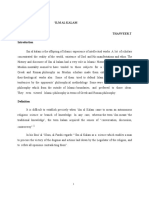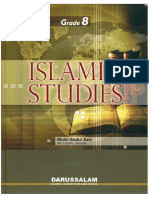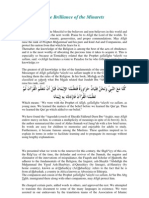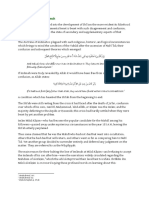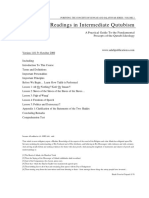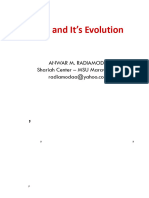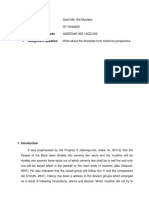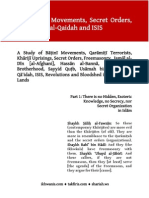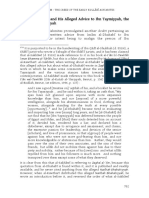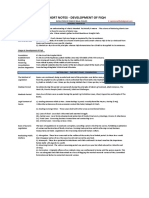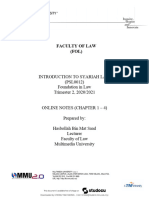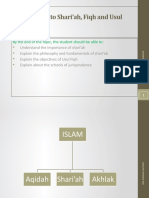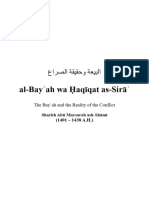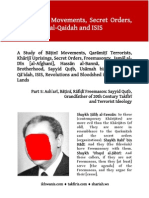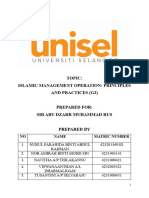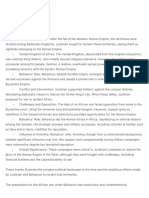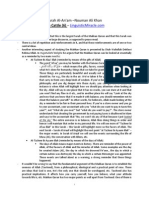Creed Kullabi Asharis p037
Creed Kullabi Asharis p037
Uploaded by
omid.baei.2007Copyright:
Available Formats
Creed Kullabi Asharis p037
Creed Kullabi Asharis p037
Uploaded by
omid.baei.2007Copyright
Available Formats
Share this document
Did you find this document useful?
Is this content inappropriate?
Copyright:
Available Formats
Creed Kullabi Asharis p037
Creed Kullabi Asharis p037
Uploaded by
omid.baei.2007Copyright:
Available Formats
ASHARIS.
COM - THE CREED OF THE EARLY KULLĀBĪ ASHʿARITES
the individuals concerned were al-Jaʿd bin Dirham (ex. 118H) and al-
Jahm bin Ṣafwān (ex. 128H), their followers became known as the
Jahmiyyah. Alongside their own innovations regarding Allāh's Names
and Attributes and His Tawḥīd, they carried the bidʿah of the Murji'ah
and exaggerated in al-Qadar, pioneering the bidʿah of al-Jabar. At the
who took somethingof their ʿusūl. The most extreme of them are the
Jahmiyyah, then after them the Muʿtazilah, then after them the Kullābiyyah
Ashʿariyyah who retained some of the ʿusūl of the Jahmiyyah in the topics of
Allāh's attributes, His actions, the reality of īmān (faith) and the innovation of
al-Jabar amongst other affairs. Refer to Imām Aḥmad's al-Radd ʿalāl-Jahmiyyah,
Imām al-Bukhārī's Khalq Afʿāl al-ʿIbād and all the early books of ʿaqīdah
(mentioned a little later) for more on this sect.
59
The Muʿtazilah are named as such, the Isolationists, on account of al-Wāṣil
bin ʿAṭā' (d. 131H) abandoning the gatherings of al-Hasan al-Baṣrī (d. 110H)
and differing with him on the issue of those who commit major sins. They are
the foremost of those who put reason ahead of revelation, developing this
theme as a major part of their doctrinal school. Although there were many
factions of the Muʿtazilah, there were two main schools, one seated in Baghdād
and the other in Baṣrah, both in Irāq. They carried the innovations of the
Khawārij, the Qadariyyah and took negation of the attributes from the
Jahmiyyah. They were all united upon what they called the five principles (al-
Uṣūl al-Khamsah) in which they concealed their false principles and
innovations. They are: 1) al-Tawḥīd (monotheism), and what they mean by this
is to deny Allāh's attributes, deny Allāh will be seen in the Hereafter, and
claim the Arabic Qur'ān is created. 2) al-ʿAdl (justice), and what they mean by
this is that there occurs in the creation what Allāh does not will and Allāh does
not will what actually occurs, and that He did not create the actions of the
servants, rather the servants choose and create their own actions outside of
the domain of Allāh's will and creative ability. 3) al-Waʿd wal-Waʿīd (promise
and threat), and what they meant is that if Allāh makes a promise or threat in
the Qur'ān for obedience or disobedience, and He is the most truthful, it must
by necessity befall a person. From this principle, they judged that anyone who
commits a major sin, is a disbeliever who will reside eternally in the Fire. 4) al-
Manzilah bayn al-Manzilatayn (position between two positions), and this is
connected to the previous principle, they treated a major sinner to have
exited faith but not quite entered disbelief as it pertains to the life of this
world, whereas in the Hereafter he is a disbeliever. 5) al-Amr bil-Maʿrūf wal-Nahī
ʿanil-Munkar (enjoining the good and prohibiting the evil), and beneath this
principle they entered the bidʿah of the Khawārij of fighting and revolting
against the rulers. The Muʿtazilah gained political strength during the era of
the Caliphs al-Ma'mūn, al-Muʿtasim and al-Wāthiq, and they put the Ummah
to trial on the issue of the Qur'ān being created during the years 218H-225H.
37
You might also like
- Māturīdī Theology A Bilingual Reader-1Document259 pagesMāturīdī Theology A Bilingual Reader-1Gamer Triggered100% (1)
- The Batini Movements, Secret Orders, Al-Ikhwan, Al-Qaidah and ISISDocument19 pagesThe Batini Movements, Secret Orders, Al-Ikhwan, Al-Qaidah and ISISKhalil19770% (1)
- Ilm Al Kalam ScholasticismDocument27 pagesIlm Al Kalam ScholasticismFerry ChandraNo ratings yet
- The Act of ShirkDocument12 pagesThe Act of ShirkMuadz AzmiNo ratings yet
- Doubt and Prerogative The Emergence of An Imāmī Shī'ī Theory of Ijtihād - Norman Calder 1989Document23 pagesDoubt and Prerogative The Emergence of An Imāmī Shī'ī Theory of Ijtihād - Norman Calder 1989studi-islam s3No ratings yet
- Islamic Studies Grade 08Document342 pagesIslamic Studies Grade 08Aamir67% (3)
- Be Careful Who You Take Your Deen From PDFDocument19 pagesBe Careful Who You Take Your Deen From PDFArman AghwaniNo ratings yet
- The Brilliance of The MinaretsDocument24 pagesThe Brilliance of The MinaretsFaruqIbnKhaldunNo ratings yet
- A Concise Treatise On The Twelve Imams - Ayatullah J. Al-TabriziDocument21 pagesA Concise Treatise On The Twelve Imams - Ayatullah J. Al-TabriziAbraxasOssuaryNo ratings yet
- CHP 3Document72 pagesCHP 3Hazieq AushafNo ratings yet
- Kalam Theology OriginsDocument30 pagesKalam Theology OriginssohaibNo ratings yet
- TabdeeDocument6 pagesTabdeefanjorin74No ratings yet
- Imamah Ten Rida and ImamahDocument4 pagesImamah Ten Rida and ImamahSagar RazaNo ratings yet
- Readings in Intermediate QutubismDocument56 pagesReadings in Intermediate QutubismAbu LiyanaNo ratings yet
- Readings in Elementary QutubismDocument29 pagesReadings in Elementary QutubismAbu LiyanaNo ratings yet
- The Baatinee Movements, Secret Organizations, Freemasonry, Al-Ikhwaan, Al-Qaidah and ISIS: Part 2 - The Subversive Baatinee MovementsDocument23 pagesThe Baatinee Movements, Secret Organizations, Freemasonry, Al-Ikhwaan, Al-Qaidah and ISIS: Part 2 - The Subversive Baatinee MovementsOnder-KofferNo ratings yet
- 1 Evolution of FiqhDocument19 pages1 Evolution of FiqhGom BearNo ratings yet
- Commentaries: An Iranian Jurisprudential Campaign: To Silence Grand Ayatollah Al-HaydariDocument8 pagesCommentaries: An Iranian Jurisprudential Campaign: To Silence Grand Ayatollah Al-HaydariSyed Aun NaqviNo ratings yet
- Aqd202 SyedDocument5 pagesAqd202 SyedarifmuztabaNo ratings yet
- The Bā Inī Movements, Secret Orders, Al-Ikhwān, Al-Qaidah and ISISDocument18 pagesThe Bā Inī Movements, Secret Orders, Al-Ikhwān, Al-Qaidah and ISISOnder-KofferNo ratings yet
- The Adhān of Uthmān: Bayān Talbīs Al AjāwirahDocument60 pagesThe Adhān of Uthmān: Bayān Talbīs Al Ajāwirahmuhammad arfaz100% (1)
- A Brief Overview of Some Deviant Sects - Shaykh Muhammad Bin Saalih Al-'UthaimeenDocument3 pagesA Brief Overview of Some Deviant Sects - Shaykh Muhammad Bin Saalih Al-'Uthaimeenoum_romaysaeNo ratings yet
- Dismantling A Khariji CellDocument1 pageDismantling A Khariji CellVox IndustriesNo ratings yet
- Pre Nasihah DhahabiyyahDocument38 pagesPre Nasihah DhahabiyyahYeshael SukkunokamiNo ratings yet
- Evolution of Fiqh - Short NotesDocument8 pagesEvolution of Fiqh - Short NotesOpinion With Ali50% (2)
- Ibn Abd Al Wahhaab Shirk 03Document16 pagesIbn Abd Al Wahhaab Shirk 03T-2000No ratings yet
- The Baatinee Movements, Secret Organizations, Freemasonry, Al-Ikhwaan, Al-Qaidah and ISIS: Part 3 - The Activities of Jamaal Al-Deen Al-IraaneeDocument26 pagesThe Baatinee Movements, Secret Organizations, Freemasonry, Al-Ikhwaan, Al-Qaidah and ISIS: Part 3 - The Activities of Jamaal Al-Deen Al-IraaneeOnder-KofferNo ratings yet
- In Defence of The Imaam of Sunnah, Al-Albaani Part 2 Al-Albaani's Creed On Actions ADocument29 pagesIn Defence of The Imaam of Sunnah, Al-Albaani Part 2 Al-Albaani's Creed On Actions AAbu LiyanaNo ratings yet
- The Shar-Iyah Method-CSP Size Fix-06!27!14Document185 pagesThe Shar-Iyah Method-CSP Size Fix-06!27!14الفرقةالناجية على منهاج النبوةNo ratings yet
- Khomeini Between Extremism and ModerationDocument66 pagesKhomeini Between Extremism and ModerationManav Kumar JaiswalNo ratings yet
- KhawarijDocument5 pagesKhawarijoceanmist0101No ratings yet
- Definitions of Aqidah and Its Relevant TaxonomiesDocument17 pagesDefinitions of Aqidah and Its Relevant TaxonomiesBrevari FridaNo ratings yet
- Al-Wilāyah Al-Takwīniyyah: An Islamic Perspective OnDocument36 pagesAl-Wilāyah Al-Takwīniyyah: An Islamic Perspective OnSheikhSulaymanNo ratings yet
- What Is Salafī IslamDocument13 pagesWhat Is Salafī IslamMuhammad Mustafa RazaNo ratings yet
- AkidahDocument10 pagesAkidahBaiti MasrurohNo ratings yet
- Early Rise of The Problem: Senior Lecturer, Shah-i-Hamadan Institute of Islamic Studies, University ofDocument17 pagesEarly Rise of The Problem: Senior Lecturer, Shah-i-Hamadan Institute of Islamic Studies, University ofALLAMAHIQBALNo ratings yet
- Athar Salaf EvidenceDocument22 pagesAthar Salaf EvidenceLito MendozaNo ratings yet
- 8.5.11 Ised Aqidah Minggu 2Document61 pages8.5.11 Ised Aqidah Minggu 2Fakhrul Islam JasmanNo ratings yet
- PSL0012 Lecture NotesDocument5 pagesPSL0012 Lecture Notes1231101882No ratings yet
- Belief in Allah V1 Umar S. Al Ashqar CompressedDocument481 pagesBelief in Allah V1 Umar S. Al Ashqar CompressedFarida Serag El DinNo ratings yet
- 8 y 08 Tyh 1 YzbkznqgibsDocument3 pages8 y 08 Tyh 1 Yzbkznqgibssweet doctorNo ratings yet
- Isis Research Paper PDFDocument4 pagesIsis Research Paper PDFaflbrozzi100% (1)
- Topic 1 INTRODUCTION TO SHARIAH, FIQH AND USUL FIQHDocument30 pagesTopic 1 INTRODUCTION TO SHARIAH, FIQH AND USUL FIQHkk100% (1)
- Seerah-Kalim SiddiquiDocument28 pagesSeerah-Kalim SiddiquiK. KhanNo ratings yet
- Analytical Study of Selected Book On Fun RijalDocument22 pagesAnalytical Study of Selected Book On Fun RijalJojo HohoNo ratings yet
- A Concise Introduction To The Khawārij - Shaikhs Ibrahim Al-Ruhayli, Saleh Al-Fawzan, Rabee' Al-Madkhali & 'Abdul 'Aziz Aalus-ShaykhDocument14 pagesA Concise Introduction To The Khawārij - Shaikhs Ibrahim Al-Ruhayli, Saleh Al-Fawzan, Rabee' Al-Madkhali & 'Abdul 'Aziz Aalus-ShaykhMountainofknowledgeNo ratings yet
- Islamic Law & JurisprudenceDocument101 pagesIslamic Law & JurisprudenceDutchsMoin Mohammad0% (1)
- Reality of BayahDocument37 pagesReality of BayahLiøn TØNo ratings yet
- Understaning Fem Singapore Week 2Document34 pagesUnderstaning Fem Singapore Week 2Fareanna AlyssaNo ratings yet
- JD 107 JurisprudenceDocument9 pagesJD 107 JurisprudenceSITTIE FAISAHNo ratings yet
- Origins of Kharijites PDFDocument69 pagesOrigins of Kharijites PDFUmmuUthmaan100% (2)
- The Bā Inī Movements, Secret Orders, Al-Ikhwān, Al-Qaidah and ISISDocument105 pagesThe Bā Inī Movements, Secret Orders, Al-Ikhwān, Al-Qaidah and ISISOnder-KofferNo ratings yet
- Preserving The Usûl - Shaykh Muhammad Ibn Sâlih Al-'UthaymînDocument5 pagesPreserving The Usûl - Shaykh Muhammad Ibn Sâlih Al-'UthaymînMountainofknowledgeNo ratings yet
- American Oriental SocietyDocument9 pagesAmerican Oriental SocietyahsanNo ratings yet
- In Defence of Imaam Al-Albaani Exposing A Qutubi Charlatan - Concerning The Tafseer of Ibn 'AbbaasDocument46 pagesIn Defence of Imaam Al-Albaani Exposing A Qutubi Charlatan - Concerning The Tafseer of Ibn 'AbbaasAbu LiyanaNo ratings yet
- Schock 2010 Belief and UnbeliefDocument11 pagesSchock 2010 Belief and UnbeliefbrizendineNo ratings yet
- A Letter On Ruling by Man Made Laws - Ahlut-Tawhid PublicationsDocument38 pagesA Letter On Ruling by Man Made Laws - Ahlut-Tawhid PublicationsAuthenticTauheed PublicationsNo ratings yet
- Springer International Journal For Philosophy of ReligionDocument21 pagesSpringer International Journal For Philosophy of ReligionFaisal AnsariNo ratings yet
- 'Aqīdah Write-Up - Qari Sauleh Peck PDFDocument54 pages'Aqīdah Write-Up - Qari Sauleh Peck PDFFizza DinNo ratings yet
- Mu'tazilah: The Rise of Islamic Rationalism: Islam Paper ThreeDocument8 pagesMu'tazilah: The Rise of Islamic Rationalism: Islam Paper ThreesherwaniNo ratings yet
- Norman Calder On IjmaDocument28 pagesNorman Calder On IjmaFatima IqbalNo ratings yet
- Mu'tazila - Use of Reason in Early Islamic TheologyFrom EverandMu'tazila - Use of Reason in Early Islamic TheologyRating: 4 out of 5 stars4/5 (1)
- The Belief of The Imamiya Concerning TawhidDocument5 pagesThe Belief of The Imamiya Concerning TawhidAhmed HilmiNo ratings yet
- IstiwaaDocument10 pagesIstiwaaIzmer BhaiNo ratings yet
- Allamah Nu'Mani and Other Deobandis On Ibn Abd Al-Wahhab and His FollowersDocument11 pagesAllamah Nu'Mani and Other Deobandis On Ibn Abd Al-Wahhab and His FollowersShahid KI100% (1)
- Articles of FaithDocument22 pagesArticles of FaithNabeel AhmedNo ratings yet
- Islam and BioethicsDocument2 pagesIslam and Bioethicsapi-247725573100% (2)
- Islam Managment AssigmentDocument30 pagesIslam Managment AssigmentNurul FarahidaNo ratings yet
- History of Pakistan and Subcontinent McqsDocument25 pagesHistory of Pakistan and Subcontinent McqsAfzal KhanNo ratings yet
- Unit 2 1st Chapter ISLAM PDFDocument29 pagesUnit 2 1st Chapter ISLAM PDFnadhanistharNo ratings yet
- Chapter 41Document22 pagesChapter 41bilalshahid00111No ratings yet
- First Five Quranic PassagesDocument4 pagesFirst Five Quranic PassagesrameenNo ratings yet
- Islam Topic 1 Sample Essay Booklet Religious Beliefs, Values and TeachingsDocument9 pagesIslam Topic 1 Sample Essay Booklet Religious Beliefs, Values and TeachingsSameehaNo ratings yet
- The Paradox of The Duty of Perfection in The Doctrine of Ibn 'Arabi PDFDocument7 pagesThe Paradox of The Duty of Perfection in The Doctrine of Ibn 'Arabi PDFyusuf shaikhNo ratings yet
- 6 - Surah-al-An'amDocument142 pages6 - Surah-al-An'ammostromNo ratings yet
- Fiqhul IbaadatDocument178 pagesFiqhul Ibaadatbint_shamsNo ratings yet
- Obeying Chiefs and Leaders in Disobedience of AllahDocument25 pagesObeying Chiefs and Leaders in Disobedience of AllahquranictopicsNo ratings yet
- Contemporary Islamic Artin Malaysia New Trendsand Approachessince 2000Document9 pagesContemporary Islamic Artin Malaysia New Trendsand Approachessince 2000Shariani GhazaliNo ratings yet
- Islamic ColonialDocument4 pagesIslamic ColonialMargarette Ramos NatividadNo ratings yet
- 3rd 4th and 5th Surah by FahadDocument8 pages3rd 4th and 5th Surah by FahadFahad SheikhNo ratings yet
- Sageman Understanding Terror Networks PDFDocument31 pagesSageman Understanding Terror Networks PDFPedro SerranoNo ratings yet
- Introduction To Islamic Studies: Instructor: DR - Oumar SaleemDocument16 pagesIntroduction To Islamic Studies: Instructor: DR - Oumar SaleemHammad AhmadNo ratings yet
- Pre Hamza Yusuf TahawiDocument18 pagesPre Hamza Yusuf Tahawisandeepsinghsandhu890% (2)
- Kitaab At-Tawheed: Shaikh Imam Muhammad Abdul-WahhaabDocument14 pagesKitaab At-Tawheed: Shaikh Imam Muhammad Abdul-WahhaabAnnika Fatma B. Habib100% (1)
- God in The Quran A Metaphysical StudyDocument133 pagesGod in The Quran A Metaphysical StudyFaisal Ali Haider LahotiNo ratings yet
- Allah in Himself NEW PDFDocument31 pagesAllah in Himself NEW PDFHaseeb DurraniNo ratings yet
- The Wiley-Blackwell Companion To Islamic Spirituality (Vincent J. Cornell, Bruce B. Lawrence)Document602 pagesThe Wiley-Blackwell Companion To Islamic Spirituality (Vincent J. Cornell, Bruce B. Lawrence)tubaelmassNo ratings yet
- 01 Philosophy of IBFDocument46 pages01 Philosophy of IBFamirahNo ratings yet


